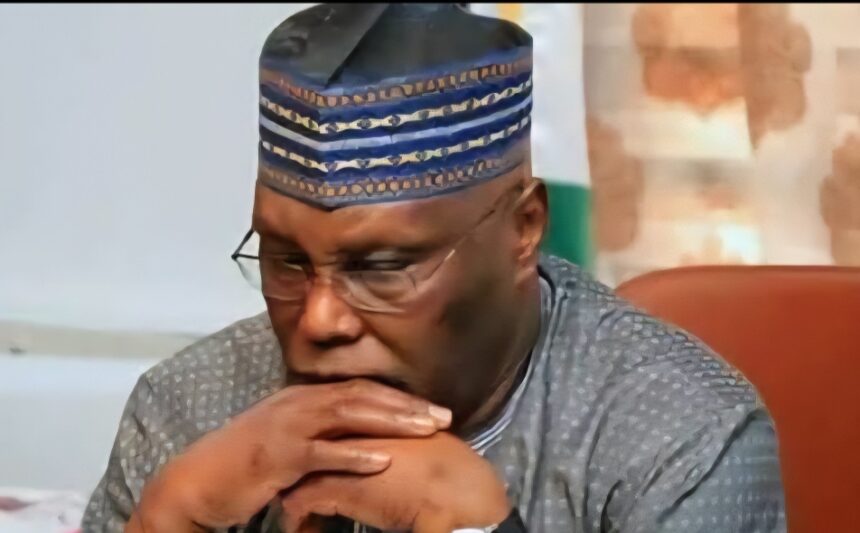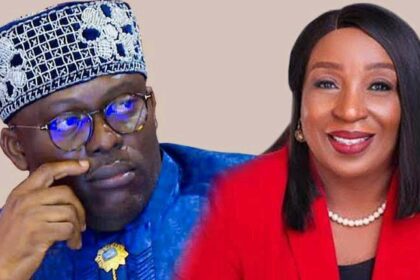There are speculations about a possible power-sharing agreement between Atiku and Peter Obi, where Atiku would serve a single term before handing over power to Obi from the South-East…
Former Vice President, Atiku Abubakar has been quiet in the past few months. In fact since the official take over of the ADC leadership structure in Abuja, the former Presidential Candidate of the PDP has been missing inaction, which made many political watchers to suggest that he may have been overwhelmed by the turn of events in ADC.
Since the coalition fused in APC, its been one crisis or the other, with new personalities in the party accusing the new leaders of ADC of having hijacked the party. Many of them headed for the courts to seek redress.


As you read this, there are about 3 cases in court, alleging that the new leaders came in through the back door.
The African Democratic Congress (ADC) is facing several challenges that contribute to its current troubles.
One is Internal Power Struggles. The party is experiencing power struggles between prominent members, such as Peter Obi and Atiku Abubakar, which could impact its chances in the 2027 elections.
The Economic and Financial Crimes Commission (EFCC) has accused the ADC of making unwarranted political statements that could heat up the polity, leading to a public spat between the two entities.
Speculation surrounds the party’s leadership, with some members questioning the current structure and decision-making processes.
The ADC has been part of discussions for potential alliances with other opposition parties, but the success of these efforts remains uncertain.
The party faces significant electoral hurdles, including competition from established parties like the APC and PDP.
What is Atikus role in all these?
Many political analysts believe Atiku adopted the ADC as the official platform for his opposition coalition, teaming up with Peter Obi and Nasir El-Rufai. This coalition aims to challenge President Bola Tinubu in the 2027 elections.
Atiku is interested in running for the ADC’s presidential ticket in 2027. He has agreed to support whoever wins the party’s primary, provided the process is transparent.
Insiders claim Atiku is financing efforts to control the party’s internal structure, potentially positioning himself for a strong run in the 2027 elections.
There are speculations about a possible power-sharing agreement between Atiku and Peter Obi, where Atiku would serve a single term before handing over power to Obi from the South-East. However, this hasn’t been officially confirmed.
Atiku’s move to the move is seen as a strategic play to strengthen the opposition and potentially challenge President Tinubu’s influence. His role in the party is expected to be significant, given his experience and influence in Nigerian politics.
How come Atiku has not been talking in the last few months?
We gathered that Atiku Abubakar’s silence might be due to how his recent defection from the Peoples Democratic Party (PDP) to the African Democratic Congress (ADC), generated significant attention and speculation. As a high-profile figure, Atiku’s actions and decisions are closely watched, and his silence could be a strategic move to allow his actions to speak louder.
Some possible reasons for his silence include Strategic planning. Some have argued that Atiku might be focusing on solidifying his position within the ADC and building alliances with other key stakeholders before making public statements.
Atiku reportedly wants to formally join the ADC in person, allowing the public to see him picking up his membership card and completing formalities, which would maximize media visibility and impact.
As the ADC is still in the process of establishing itself, Atiku might be cautious about making statements that could be perceived as divisive or premature.
Many think Atiku is likely to clinch the ADC presidential ticket.
Atiku Abubakar’s chances of clinching the African Democratic Congress (ADC) presidential ticket for the 2027 elections look very promising, according to various analysts and political insiders. Some key points to consider include,
Atiku’s support base, particularly in the North, is seen as a significant factor in his favor. His loyalists are reportedly occupying key positions in the ADC’s National Working Committee, Board of Trustees, and state chapters, which could influence the party’s presidential ticket.
Resolving the African Democratic Congress (ADC) cases in court requires a strategic approach.
Why is Atiku and other party elders keeping mum about it? The African Democratic Congress (ADC) elders could potentially step in to resolve the party’s crisis, but it seems challenging given the current court cases and internal conflicts.
Three aggrieved members have filed a suit at the Federal High Court in Abuja, seeking the removal of the Senator David Mark-led interim leadership. The court will need to resolve these issues before any internal resolution can take place.
The ADC is facing a leadership crisis, with some members questioning the legitimacy of the current interim leadership. Elders stepping in would require broad acceptance from party members.
The ADC Constitution outlines the process for leadership selection and dispute resolution. Elders would need to work within this framework to find a solution.
Some say powerful interests, including those in the Presidency, might be influencing the party’s dynamics, which could complicate the elders’ efforts to resolve the crisis.





Nul and void